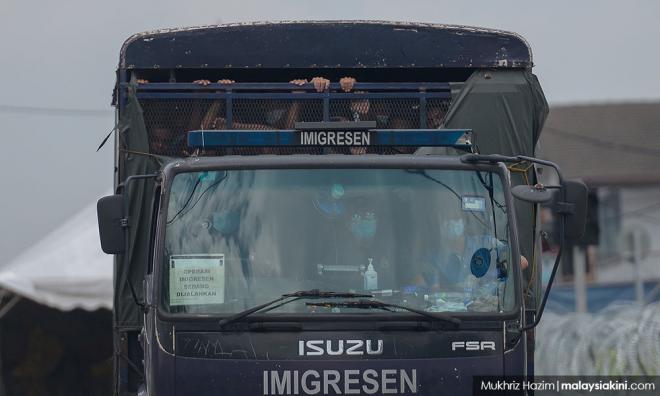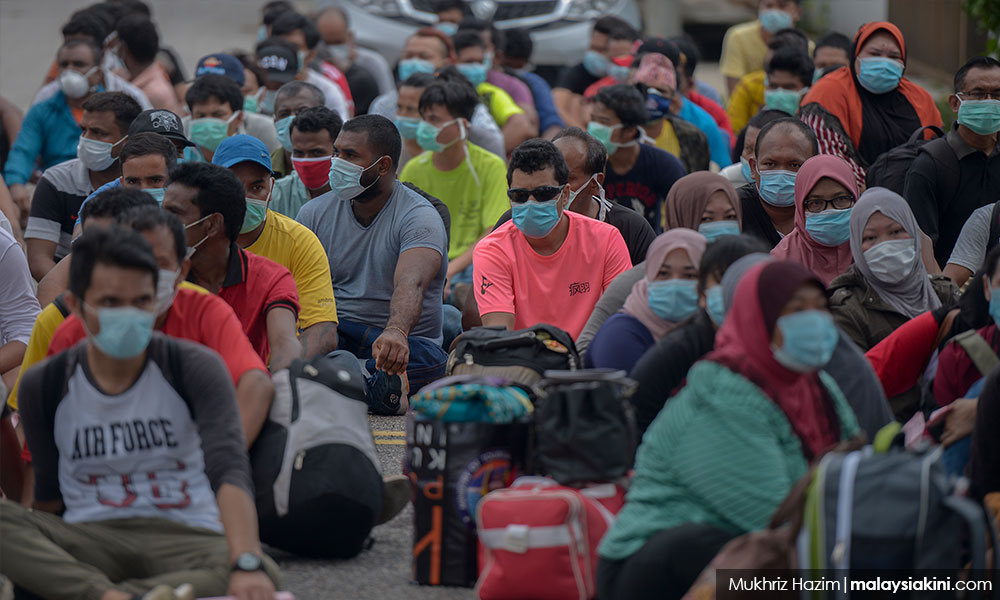
The frequent and harsh immigration raids on migrant communities during the lockdown are becoming a defining feature of the Covid-19 pandemic in Malaysia. The raids continue to elicit mixed responses from the public and are dominated by disturbing anti-migrant and xenophobic sentiments.
Who is to blame for Pati (pendatang asing tanpa izin)? The immigration department and louder segments of our population seem to put the blame entirely on the migrants themselves.
There are said to be more than four million Pati or undocumented migrants in Malaysia. They are not a homogenous group, and it appears all categories of "illegal" foreigners are classed together under a common label. Pati includes once documented migrant workers who have become undocumented while here, refugees fleeing persecution in their homelands, tourists who have overstayed, and foreigners who have purportedly entered the country with sinister motives.
Whatever the government’s intention of lumping together refugees, victimised migrant workers and intruders with ulterior motives, they are dealt the same form of rough justice, at least as far as raids go. All are treated, as the last category of Pati, as a national security threat, enemies to be flushed out without mercy.
National security is doubtless a top concern for any country, and a government can be expected to be uncompromising in its treatment of foreign intruders with insurgency on their minds. This is the domain of the Immigration Department among others, and the public has little quarrel with that. But what is unacceptable is the treatment of refugees and undocumented migrant workers also as enemies of the state.
Firstly these two groups are not a security threat; secondly, successive governments must take a large share of the blame for the current state of affairs. Both the BN and Pakatan Harapan governments failed to address the many burning yet not impossible to solve issues arising from labour migration and the refugee issue.
One example is the government’s reluctance to consider the proposal to absorb already available refugee labour (numbering about 120,000?) into the workforce before recruiting migrant workers. This would fulfil the need for refugees to earn a living while being in a probably lengthy transit.
This is for sure a tricky matter, bound to meet hitches, but still, inaction cannot be a way out. Pretending the problem doesn’t exist or postponing its resolution merely drives the problem underground and leaves communities to fend for themselves by begging or selling their labour at extremely exploitative terms.
Malaysian governments up till now and the ruling elite must also take a big share of the blame for the Pati who are undocumented migrant workers. The privatisation of the recruitment and management of migrant labour turned the migration of hundreds of thousands of impoverished, indebted labour itself into a lucrative industry not least for members of the ruling elite and their cronies.

Under these circumstances, there has been reluctance to craft a comprehensive policy to properly regulate a millions-strong sector that has such a huge impact on the economy and the local population. Added to this has been the rampant corruption of enforcement bodies linked to labour migration. As a result of these weaknesses and failings, an overwhelming number of workers entering the country legally, with passports and work permits have become illegal.
For years and years, civil society has lobbied hard for a comprehensive policy on labour migration for migrant labour and refugees. There are so many gaps in existing policy that contribute to migrant workers losing their legal status. But the BN government moved lethargically on this, understandably, as many of its members, including a top cabinet minister were earning handsomely from this sector.
The Harapan government initially showed promise by appointing an independent committee to study and make recommendations to set right the situation. But they disappointed by suppressing the recommendations of the committee. Why? Is it because they preferred a labour market that is flooded with undocumented workers who can depress the floor for wages?
Targeting of migrants who play a big role in our economy (over 70 percent of SMEs employ undocumented migrant workers), and who are mostly victims of weaknesses in our policies, blinds us to the real cause of a situation that has spun out of control. The labelling of all migrants without papers as Pati is problematic – refugees and undocumented migrant workers cannot be dealt with in the same way as terror suspects.
Do raids work? Despite the many raids over the years, the Pati figure seems to have remained constant showing that raids are not the alternative to sound policies. The 11th Malaysia Plan provides an excellent roadmap to reform a migration situation that is beset with problems and controversy. The plan undertakes to formulate a comprehensive immigration and employment policy based on industry needs and the welfare of migrant workers.
Employers are to take full responsibility for the recruitment process and welfare of the workers, and pay the levy (to deter overdependence on migrant workers). Importantly, the plan talks about eliminating the role of private agents, and place the recruitment, monitoring and management of migrant workers under the government, with the Human Resources Ministry taking the lead.
Further, it says that the issue of undocumented workers will be addressed through "better management and effective enforcement".
Unfortunately, despite such an enlightened plan, there has been no political will to make meaningful changes.
RANI RASIAH is a central committee member of PSM. - Mkini



No comments:
Post a Comment
Note: Only a member of this blog may post a comment.